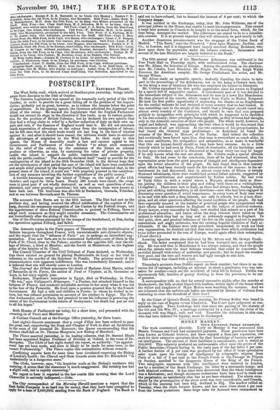The fifth annual soirée of the Manchester Atheneum was celebrated
in the Free Trade Hall on Thursday night, with undiminished éclat. The chairman was Mr. Alison, the historian of Europe. Among the gentlemen on the platform, were Mr. Cobden, Lord Brackley, Mr. Bright, Dr. Bowring, Mr. Ralph Waldo Emerson the American essayist, Mr. George Cruikshank the artist, and Mr. George Wilson.
Mr. Alison made an 'agreeable speech; modestly founding his claim to take part in the proceedings of the Athenieum, not on his being a literary man, but on his being a man of laborious life who has employed his leisure in literature.
Mr. Cobden signalized his first public appearance since his return to England by a speech full of suggestive matter. A considerable part of it was devoted to the immediate subject of the Athenaium and its uses in a town like Manchester. He then glanced at his travels, which ranged from Cadiz to Nishni Novgorod. He took the first public opportunity. of expressing his thanks as an Englis for the cordial welcome he had received in every country that he had visited. It was something rare in the annals of the world, that a foreigner should travel into almost every country of the Continent, and should in each find men prepared publicly to sympathize with principles with which he happened to be identified in his own country; these principles being applicable, as they at home had thought, only to the domestic concerns of their own people. The whole world, however he hoped and believed, was approaching the time when it would be discovered that the interests of all are identical. At the two extremes of his peregrinations, he had found the Oriental type predominate : in Andalusia he found the remains of the Moor; in Moscow, of the Tartar. And indeed the reflection had continually been forced upon him, that man is everywhere so much alike, in his moral attributes, his sympathies and antipathies, as to make it wonderful that this one human family should so long have been enemies. As in a little comedy which he had seen at Paris, Faute de ientendre, all the hardships seem to rest upon mistakes; and it is discovered at last that every one may be happy if be only knows what the rest are about. Mr. Cobden made a special allusion to Italy. He bad come to the conclusion, from all he bad witnessed, that the regeneration arose from the quiet progress of thought and intelligence dependent upon the better education of the people. He had found that in that country great efforts had been recently made for the education of the masses: to his as- tonishment he had discovered, that in almost every town of fifteen or twenty thousand inhabitants, there were established several infant schools, supported by voluntary contributions and superintended by Italian nobles. He had even at Turin fallen in with a school where a Marquis attended daily as direc- tor, joining the children in their play and riding with them on a rockingborse. (Laughter.) There were now in Italy, as there had always been, leading minds, great and striking individualities, in all directions—men who had been engaged in discussing every question of social importance; in every town of Italy men were to be met with who took a deep interest, not only in schools, but in pison disci- pline, and all other questions affecting the moral condition of the people. He had been especially amazed at the number of practical people who sympathized with their efforts and controversies in England on the subject of political economy. Every lawyer, every counsellor in Italy, now studied that science as a part of his professional education: and hence arose the deep interest there taken on that subject in which they bad so long and so arduously engaged in England. To this quiet, slow, and gradual influence of the few on the many, and not to popular commotion and angry outbreaks, was the existing hopeful condition of Italy at- tributable. If the Italians were only permitted, unmolested, to work out their own regeneration, he doubted not that that same race from which civilization had twice before proceeded to the rest of Europe, would again effect their redemption. (Loud cheers.) Amusing speeches were also delivered by Mr. Alison and Mr. George Craik- shank. The latter complained that he had been betrayed into an unprofitable trip. He was told that in Manchester it was always raining, and that the people about the streets were the most hideous wretches that could be conceived: he provided himself with relays of umbrellas and pencils; but he found the weather very good, and the men and women not half ugly enough to suit him.
The evening was closed with a ball.


























 Previous page
Previous page